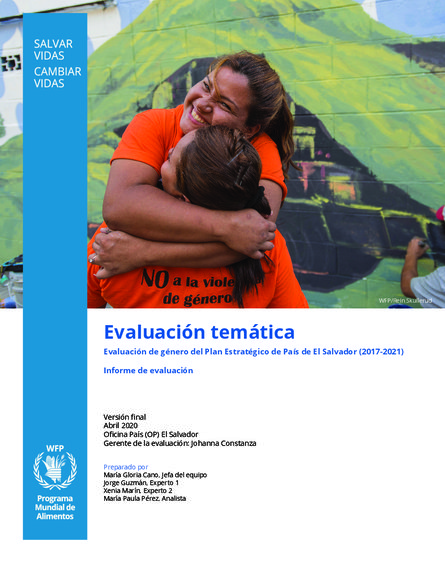
This decentralized evaluation was commissioned by the WFP El Salvador Country Office and covers the “Evaluación Temática de Género del Plan Estratégico de País de El Salvador 2017-2021” for the period from April 2017 to December 2019. It was carried out from October 2019 to May 2020.
The evaluation was commissioned to reviewing the CSP in the light of gender issues and was intended for both accountability and learning purposes. Accountability for the WFP's contribution to the new Government Administration: and learning as guidance for the design of the new CSP, which will seek to be aligned with the new United Nations Cooperation Framework for Sustainable Development (SNU-UNSDCF) and the New Administration's Governance Plan. It focused on assessing the relevance, effectiveness, efficiency, impact, and sustainability of the adopted GEWE approach. Overarching evaluation questions focussed on:
To what extent the CSP design included the GEWE's approach in its strategic effects and as cross-cutting in the activities to be evaluated?
To what extent were the planned and unplanned GEWE outcomes and outputs in the CSP achieved?
How are the GEWE results perceived by beneficiary women and men?
To what extent have the achieved GEWE's CSP outcomes been maintained over time, after the end of the programme/project?
Is the implementation of GEWE activities in the CSP the most efficient way to address the approach, compared to other intervention models?
To what extent have other factors (internal or external) influenced the performance of the CSP related to GEWE to date?
Key evaluation findings included:
The CSP document includes guidelines that partially respond to WFP's GEWE policy, but there was not explicit activities or objectives.
During the CSP implementation process, GEWE focused on parity of women's economic participation and empowerment, not really moving towards gender transformative outcomes.
Gastromotiva and ConectArte, are the programs that show evidence of gender transformative impacts, for their intentionality and also by being concentrated in young and urban people.
The actions implemented by WFP-CO cannot be interpreted as a "model" since it was more a sum of actions that were taken, with more focus on empowerment than in equity.
The determining factor in the low level of implementation of gender approach has been the weak internalization of GEWE into the CO team.
Key recommendations from the evaluation included:
The WFP-CO team must become aware of GEWE approach through trainings, knowledge management, an internal gender network with expert advice at GEWE so all staff can internalize what it is and what it implies. And the CO should assess the progress made in the GEWE training and internalization process.
Develop and implement a GEWE's "living" theory of change adapted for WFP-CO El Salvador and review and adapt GEWE monitoring indicators.
Adjust actions in the project cycle operation according to GEWE's approach (using the Gender Toolbox adapted to WFP-CO) and implement actions to achieve impacts on gender transformation, in relation to food and nutrition insecurity, within beneficiary communities, men and women